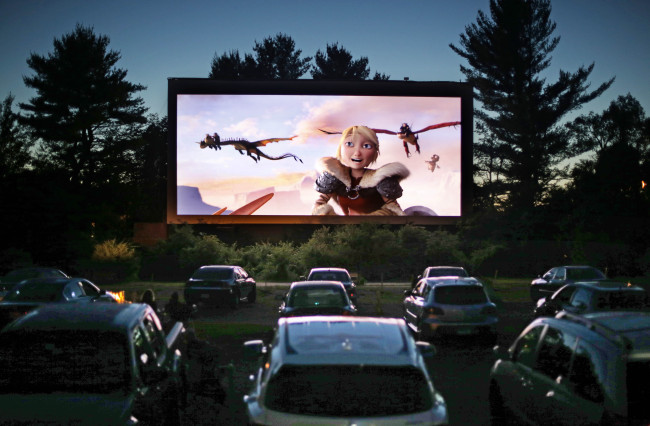SACO, Maine (AP) ― Many in the movie industry feared the need to convert to digital could be the death knell for drive-ins, but drive-in operators are finding creative ways to afford the switch.
Drive-in movie theater operators say more than 200 of the remaining 348 drive-ins in the U.S. have made the expensive conversion from film to digital, which typically costs more than $70,000. Theater owners say conversions escalated quickly in 2013 and will help keep the drive-ins in business for now, promising news for an industry that peaked in the 1950s and ’60s, then with more than 4,000 drive-in theaters nationwide.
Some drive-ins are raising money using crowdfunding platforms such as Kickstarter while others are taking advantage of financing programs or renting out their theaters as flea markets during off-hours.
Ry Russell, general manager of Saco Drive-In, launched a social-media campaign to win an $80,000 digital projection system in a contest sponsored by Honda. His drive-in theater in Saco, Maine, is celebrating its 75th anniversary by welcoming hundreds of cars to its giant roadside screen to watch the latest films on a new digital projection system.
 |
Moviegoers watch “How to Train Your Dragon 2,” the first movie of a double feature at the Saco Drive-In in Saco, Maine, June 26. (AP-Yonhap) |
“We’re just seeing Darwinism kind of take over,” Russell said. “The ones that survive will prosper.”
It’s a story that’s playing out at drive-ins all over the U.S., where conversion to digital is the key to survival, said John Vincent Jr., president of the United Drive-In Theatre Owners Association. Studios are phasing out 35mm film prints as Hollywood moves toward all-digital distribution.
Even older movies are difficult to obtain on film because many repertory companies have gone digital, said Vincent, noting that people in the industry expect this season to be “the last summer of film.”
In Westbrook, 24 kilometers up the road from Saco, the owners of the 62-year-old Pride’s Corner Drive In are struggling just to keep business alive ― they can only show movies in 35mm film and have raised just $1,350 of the $100,000 they need to convert to digital.
“When they stop making film, that’s it,” said Andrew Tevanian, operator of Pride’s Corner. “Then you’re out in the cold.”
These days, moviegoers in 44 states can take in a drive-in movie from the comfort of their own vehicles, according to the United Drive-In Theatre Owners Association. New York, Ohio and Pennsylvania have the most drive-ins, with nearly 30 each; Indiana has 20 and California has 17. Alaska, Delaware, Hawaii, Louisiana, North Dakota and Wyoming are the only states without a drive-in.
In Rhode Island, Rustic Drive In in Smithfield sometimes welcomes 500 cars on a Saturday. It needs to because the company that owns the theater spent more than $200,000 on three new digital projectors for its three screens. The company is taking advantage of an offer from Los Angeles-based Cinedigm Digital Cinema Corp., which arranges flexible loans and reimbursements from studios, a representative said.
The conversion means the 63-year-old drive-in is in it for the long haul, said Deborah Belisle, vice president of the company that runs the theater.
“That is saying we’re staying,” Belisle said. “The ones that are left now, they’re not going anywhere.”








